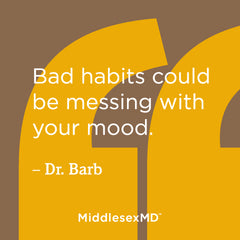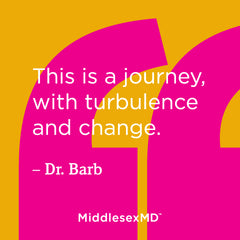In the last couple of posts we talked about the significant subset of women who suffer from debilitating emotional swings during the menopausal transition—and also about their loved ones who suffer right along with them.
It’s a Catch-22. You truly can’t control the hormonal storm that lashes you with sudden waves of uncontrollable rage, sadness, irritation, anxiety, and depression. Yet, you really can’t unleash these emotions on the people closest to you. People whom you love and have no wish to harm.
If you are caught in that cycle, there is work to be done, stat, to stabilize your emotions and allow you to get through this transition without further disruption to your life or hurt to your closest relationships.
I’m going to lay out your options, but you also need to have a conversation with your doctor, who will assess your risk factors and monitor your response to treatment.
Before you consider medications, you must lay a foundation of good health habits, if you haven’t already. I’ve mentioned this, oh, maybe a thousand times before, but that’s because it’s so important. Good health hygiene is even more critical now because some of those bad habits could be messing with your mood.
Exercise regularly. Just 30 minutes of moderate daily exercise improves circulation, relieves stress, improves sleep, makes your heart stronger, and more to the point, improves mood by releasing endorphins, which gives you a little euphoric lift.
 You also have to eat moderately and healthfully. That means cutting down on sugar and caffeine, which causes mood and energy to peak and crash. In Great Britain, fish and veggie-eating folks had fewer depressive episodes than their junk-food-eating colleagues. In Spain, those who filled up on nasty trans-fats from pastries and fast food were 48 percent more likely to be depressed than those who ate good fat, such as olive oil. (And these folks weren’t even menopausal!) Magnesium is also linked to mood and sleep, so a magnesium supplement might be in order.
You also have to eat moderately and healthfully. That means cutting down on sugar and caffeine, which causes mood and energy to peak and crash. In Great Britain, fish and veggie-eating folks had fewer depressive episodes than their junk-food-eating colleagues. In Spain, those who filled up on nasty trans-fats from pastries and fast food were 48 percent more likely to be depressed than those who ate good fat, such as olive oil. (And these folks weren’t even menopausal!) Magnesium is also linked to mood and sleep, so a magnesium supplement might be in order.
At the risk of being an absolute killjoy, you also have to stop smoking and cut back on alcohol, both of which affect mood. Alcohol, of course, is a depressant. I’m not talking about a glass of wine with dinner, but about regular and/or heavy drinking.
A further brick in that health foundation is to develop a strategy for relieving stress—meditation, yoga, mindfulness practice, or another religious practice that is meaningful to you. These are known to relieve stress, stabilize mood, relieve pain, including psychic pain, and generally make life more hopeful.
I am not for a minute saying that an honest self-improvement plan will be easy or immediate—in fact, it’s a lifelong endeavor. I’m also not saying that good health alone will adequately address your menopausal mood swings. But I can assure you that getting in shape, eating well, and implementing a spiritual practice will absolutely help, both now and later.
Now let’s address the medical options. Your healthcare provider will need to work with you to find the best treatment. So it’s time for a heart-to-heart with your doctor. Ask her about:
-
 Hormone Therapy (HT). We've learned a lot about HT over the last decade. For many women, it's hormone fluctuations that lead to disruptive symptoms. Using hormones systemically to counter that can be a good choice for some women. Reviewing your health status and risks can help determine whether you're a good candidate for HT. It’s even possible that going on a birth control pill for the hormonal effect might bring relief.
Hormone Therapy (HT). We've learned a lot about HT over the last decade. For many women, it's hormone fluctuations that lead to disruptive symptoms. Using hormones systemically to counter that can be a good choice for some women. Reviewing your health status and risks can help determine whether you're a good candidate for HT. It’s even possible that going on a birth control pill for the hormonal effect might bring relief. - Mood medications. This approach, using anti-anxiety, sleep aid, or antidepressant medications, works on your brain rather than your hormones, and many women find them effective during this menopausal transition. Antidepressants work because the brain has many estrogen receptors, and when you lack estrogen, the feel-good neurochemical, serotonin, tends to break down. So, the class of antidepressant that may give you relief is called a selective serotonin reuptake inhibitor (SSRI), such as Prozac, Zoloft, or Celexa. Antidepressants can dampen libido, which is the last thing you need right now, so work closely with your healthcare provider to find the right medication and the right dosage. And addressing lack of sleep or an excess of anxiety can break the cycle just enough for some breathing room for taking control in other ways.
Medication isn’t a substitute for those common-sense efforts to improve your overall quality of life, but they can help you get through this bad patch.
This is a long journey, ladies, accompanied by a lot of turbulence and change. Life will be different—and very likely better—on the other side.
Traveling mercies.
 Dr. Barb DePree, M.D., has been a gynecologist and women’s health provider for almost 30 years and a menopause care specialist for the past ten.
Dr. Barb DePree, M.D., has been a gynecologist and women’s health provider for almost 30 years and a menopause care specialist for the past ten.



0 comments